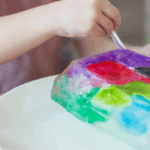
Top Tips: Poetry in the early years
Getting into the habit of describing the world around us is a wonderful way to build a rich vocabulary and lays the foundation for creating and appreciating poetry.
To celebrate World Poetry Day, why not share these top tips with parents to encourage them to create poems at home?
Tips to encourage parents to create poems in the early years
- The more children hear and play with words, the more they will develop a wider vocabulary to support the development of their spoken and written communication
- In quiet moments, encourage your child to engage their senses and observe and describe the sights, sounds, and smells of their immediate environment, for example ask them, “What do you see, feel, smell, or hear right now?” You could start the conversation by describing what you are experiencing. Once you have shared a few descriptions, repeat them one after the other to create a poem
- Make a collaborative poem by taking turns to add a word, phrase, or line. This builds language skills and can be a lovely, shared experience. If you and your child speak more than one language, choose the language you have the widest vocabulary in, or use a combination of words from each language to create a unique bilingual poem
- Explore children’s poetry together. Read poems aloud to show your child how rhythmic language can sound
- Children love to play with silly and nonsense words. Find silly poems with creative word combinations, made-up words and non-sensical verses, to demonstrate how funny poems can be. Make up some nonsense poems together
- The goal is to celebrate creativity with language and to enjoy the process. There is no right or wrong – simply have fun together while helping your child to learn about language.
Supporting early language development in children
Our “Vocabulary and Early Language Skills” online course is designed for early years practitioners to support children’s language development. It covers strategies for helping children with communication difficulties, understanding language development theories, creating language-rich environments, using stories to build vocabulary, and supporting language development at home. Book your place
Disclaimer: Activities with children must always be risk assessed, including for allergies or choking. Children must always have adequate supervision. Resources and materials must always be appropriate for children’s age and stage of development.
- MyNDNA
Similar Articles
Top tips: Supporting your team’s well-being

Early years activity: Frozen balloon explorers


